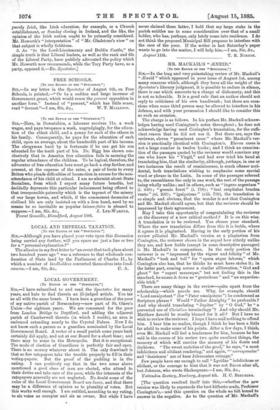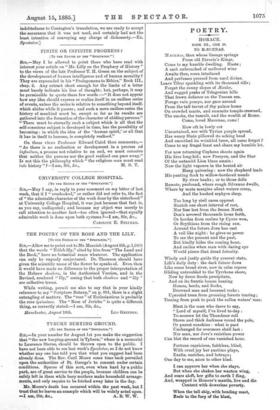MR. MACKAIL'S " /ENEID."
[To THE EDITOR OF THE " SPECTATOR."]
Sta,—In the long and very painstaking review of Mr. Mexican's " /Eneid " which appeared in your issue of August 1st, among many censures which, although they have all the weight of the Spectator's literary judgment, it is possible to endure in silence, there is one which amounts to a charge of dishonesty, and this is not so tolerable. It is a good rule that an author should not reply to criticisms of his own handiwork ; but there are occa- sions when some third person may be allowed to interfere in his defence, and with your permission I should like to consider this as such an occasion.
The charge is as follows. In his preface Mr. Mackail acknow- ledges having used Conington's notes throughout ; he does not acknowledge having used Conington's translation, for the suffi- cient reason that he did not use it. But there are, says the reviewer, eleven "prominent cases " where Mr. Mackail's ver- sion is practically identical with Conington's. Eleven cases is not a large number in twelve books ; and I think an examina- tion of the passages quoted by the reviewer would convince any one who knew his " Virgil," and had ever tried his hand at translating him, that the similarity, although, perhaps, in one or two instances the result of reminiscence, is much oftener acci- dental, both translations wishing to emphasise some special word or phrase in the Latin. In some of the passages referred to, the resemblance lies only in one word, the rest of the passage being wholly unlike ; and in others, such as " ingens argentnm " (i. 640) ; " gremio fovet " (i. 718) ; " leni crepitabat bractea vento " (vi. 209); " ignipotens " (viii. 709), the translation is so simple and obvious, that the wonder is not that Conington and Mr. Mackail should agree, but that the reviewer should be impressed by their agreement.
May I take this opportunity.of congratulating the reviewer on the discovery of a new critical method P It is on this wise. A translation is to be reviewed. You choose your standard. Where the new translation differs from this it is feeble, where it agrees it is plagiarised. Having in the early portion of his review pilloried Mr. Mackail's version as a plagiarism from Conington, the reviewer shows in the sequel how utterly unlike they are, and how feeble (except in some descriptive passages) is Mr. Mackail's in comparison. In the early portion the reviewer is so " impressed -by the vigour and felicity " of Mr. Mackail's "task and toil" for "opera atque labores," which Conington also has, that he thinks he must have stolen it; in the latter part, coming across a similar alliteration, " God and ghost " for " snperi manesque," but not finding this in the standard, he scores it down as "gratuitous " and "an unpardon- able trick."
There are many things in the review—quite apart from the scholarship—which puzzle me. Why, for example, should " Lord omnipotent " (for "Pater omnipotens ") be condemned as Scripture phrase ? Would " Father Almighty " be preferable ? And why should translating " Jupiter " by " 0 God," be " a perverted use of Christian terminology "? And why should Mr. Matthew Arnold be cruelly blamed for it all P But I have no wish to review the reviewer. I hope I have said nothing to offend him. I bear him no malice, though I think he has been a little far afield to make some•of his points. After a few days, I think, even Mr. Mackail will feel a tenderness for him, because he has said in the course of his review two quite excellent things, the memory of which will survive the memory of his flouts and dryblows. " The sweet societies of the good," he says, " a most infelicitous and sibilant rendering," and again, "`corresponsive ' and `desistence' are of base Johnsonian coinage."
Few people have ear enough to call " Lycidas " infelicitous or sibilant, or the courage to hint that it was not Bacon after all, but Johnson, who wrote Shakespeare.—I am, Sir, 4.,
Yattendon Rectory, Newbury, August 4th. H. C. Thincuniz.
[The 'question resolved itself into this,—whether the new version was likely to supersede the best hitherto made, Professor Conington's,—and this question on the whole we felt bound to answer in the negative. As to the question of Mr. Mackail's
indebtedness to Conington's translation, we are ready to accept the assurance that it was not used, and certainly had not the least intention of conveying any charge of dishonesty.—ED. Spectator.]



































 Previous page
Previous page